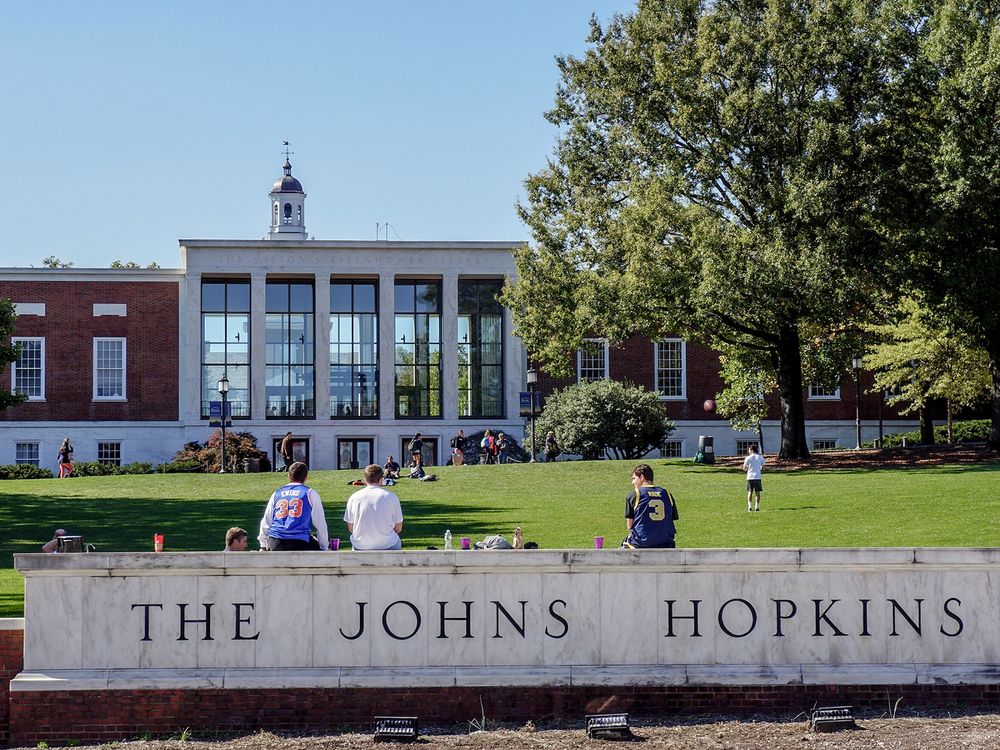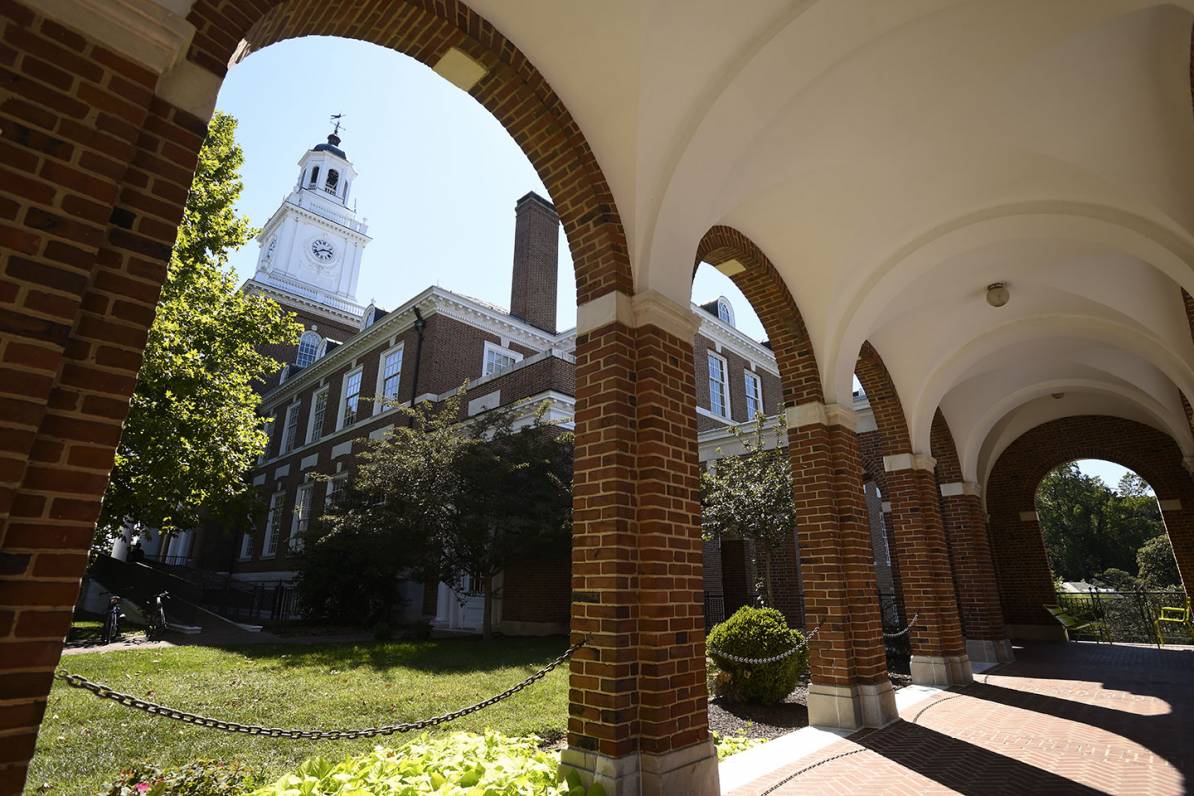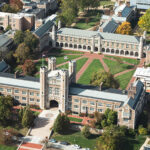Johns Hopkins University News sets the stage for this enthralling narrative, offering readers a glimpse into a story that is rich in detail and brimming with originality from the outset.
From its humble beginnings as a medical school in Baltimore, Johns Hopkins University has grown into a global powerhouse of research and education. This esteemed institution has shaped countless lives through its world-renowned faculty, groundbreaking discoveries, and commitment to academic excellence. Prepare to embark on a journey through the halls of history, where innovation and impact are intertwined, and discover the enduring legacy of Johns Hopkins University.
Johns Hopkins University

Johns Hopkins University, a world-renowned institution of higher learning, has been a leading force in research and education since its founding in 1876. Established by the visionary philanthropist Johns Hopkins, the university has a rich history of academic excellence and groundbreaking discoveries.
History and Founding
Johns Hopkins University was founded in 1876 by Johns Hopkins, a Baltimore businessman and philanthropist, who bequeathed his fortune to establish a university and a hospital. The university was designed to be a model of higher education, emphasizing research and graduate studies. The first classes were held in 1876, and the university quickly gained a reputation for its rigorous academic standards and its commitment to innovation.
Academic Reputation and Global Research Impact
Johns Hopkins University consistently ranks among the top universities in the world, renowned for its academic rigor and groundbreaking research. The university’s faculty includes Nobel laureates, MacArthur Fellows, and other distinguished scholars, who are at the forefront of their fields. Johns Hopkins is a major contributor to global research in medicine, engineering, public health, and the humanities.
Schools and Departments
Johns Hopkins University is comprised of nine schools and divisions, each dedicated to a specific area of study:
- The Krieger School of Arts and Sciences: Offers undergraduate and graduate degrees in the humanities, social sciences, and natural sciences.
- The Whiting School of Engineering: Known for its pioneering work in engineering, with a strong focus on research and innovation.
- The School of Medicine: A leading medical school, renowned for its groundbreaking research and clinical care.
- The Bloomberg School of Public Health: One of the world’s leading public health schools, focusing on global health challenges and solutions.
- The School of Nursing: A highly respected nursing school, known for its innovative programs and commitment to excellence.
- The Carey Business School: A top-ranked business school, offering MBA and other business-related programs.
- The Peabody Institute: A renowned music conservatory, known for its exceptional music education and performance programs.
- The School of Education: Committed to improving education through research, policy, and practice.
- The Applied Physics Laboratory: A leading research and development center, working on projects for national security and defense.
Notable Alumni and Faculty
Johns Hopkins University boasts a distinguished lineage of alumni and faculty who have made profound contributions to their respective fields, shaping the landscape of academia, research, and industry. This section delves into the remarkable achievements of prominent alumni and renowned faculty members, highlighting their groundbreaking work and the university’s enduring impact on various sectors.
Prominent Alumni
The university has nurtured numerous individuals who have gone on to achieve remarkable success in diverse fields.
- Dr. Jonas Salk: A renowned virologist, Salk developed the first successful polio vaccine, a groundbreaking achievement that revolutionized public health and eradicated the disease in many parts of the world. He graduated from Johns Hopkins University in 1939 and earned his medical degree from the university in 1941. His work exemplifies the university’s dedication to medical research and its profound impact on global health.
- Dr. Ruth Bader Ginsburg: A trailblazing jurist and advocate for gender equality, Ginsburg served as an Associate Justice of the Supreme Court of the United States from 1993 until her death in 2020. She graduated from Johns Hopkins University in 1954 and received her law degree from Columbia University in 1959. Her legacy as a champion for social justice is deeply intertwined with the university’s commitment to fostering intellectual diversity and promoting equitable opportunities.
- Dr. Michael Bloomberg: A successful businessman and philanthropist, Bloomberg served as the 108th mayor of New York City from 2002 to 2013. He graduated from Johns Hopkins University in 1964 with a degree in electrical engineering. His entrepreneurial spirit and commitment to public service are testaments to the university’s ability to cultivate leaders who make a difference in society.
Renowned Faculty
Johns Hopkins University has consistently attracted and nurtured exceptional faculty members who are leaders in their fields, pushing the boundaries of knowledge and innovation.
- Dr. David Baltimore: A Nobel laureate in Physiology or Medicine, Baltimore made significant contributions to the understanding of retroviruses, including the discovery of reverse transcriptase. He joined the Johns Hopkins University faculty in 1972 and has served as the university’s president from 1996 to 2000. His groundbreaking research and leadership have cemented Johns Hopkins University’s position as a global leader in biomedical research.
- Dr. Alice S. Huang: A leading expert in virology and immunology, Huang made significant contributions to the understanding of the influenza virus and the development of antiviral therapies. She joined the Johns Hopkins University faculty in 1980 and has served as the director of the university’s Institute for Basic Biomedical Sciences. Her research and mentorship have inspired generations of scientists and have significantly advanced the field of virology.
- Dr. William P. Cunningham: A renowned expert in environmental science and policy, Cunningham has authored numerous influential textbooks and has played a pivotal role in shaping environmental education and research. He joined the Johns Hopkins University faculty in 1982 and has served as the university’s director of the Center for Environmental Health and Safety. His work highlights the university’s commitment to addressing global environmental challenges and promoting sustainable practices.
Impact on Industries
Johns Hopkins University’s research and academic excellence have had a profound impact on the development of various industries, particularly in the fields of medicine, technology, and finance.
- Medicine: Johns Hopkins Hospital, founded in 1889, has consistently ranked among the top hospitals in the world. The university’s groundbreaking research in medical fields such as oncology, cardiology, and neurology has led to significant advancements in diagnosis, treatment, and prevention of diseases. The university’s contributions to medical research and education have shaped the global healthcare landscape.
- Technology: Johns Hopkins University has played a vital role in the development of cutting-edge technologies, particularly in the fields of biomedical engineering, computer science, and artificial intelligence. The university’s research labs and centers have fostered innovation and have produced numerous technological breakthroughs that have revolutionized various industries.
- Finance: Johns Hopkins University’s Carey Business School has produced numerous graduates who have gone on to successful careers in finance, banking, and investment. The university’s curriculum and faculty expertise have equipped students with the skills and knowledge needed to excel in the competitive financial sector.
Cutting-Edge Research Initiatives

Johns Hopkins University is renowned for its groundbreaking research, pushing the boundaries of knowledge and tackling critical global challenges. Its researchers are at the forefront of innovation, driven by a commitment to scientific excellence and a desire to make a tangible difference in the world.
Medicine
The university’s School of Medicine is a global leader in biomedical research, with a focus on developing new treatments and cures for diseases. For instance, Johns Hopkins researchers are pioneering the use of gene editing technology to treat genetic disorders, such as sickle cell anemia. They are also working on developing personalized cancer therapies that target specific mutations in a patient’s tumor.
Engineering
The Whiting School of Engineering is home to innovative research in areas such as robotics, artificial intelligence, and materials science. Researchers are developing new materials that are lighter, stronger, and more durable, with applications in aerospace, construction, and energy. They are also pushing the boundaries of robotics, creating robots that can perform complex tasks in hazardous environments, such as disaster zones or underwater.
Public Health
The Bloomberg School of Public Health is a global leader in public health research, tackling critical issues such as infectious diseases, climate change, and health disparities. Researchers are developing innovative solutions to prevent and treat infectious diseases, such as Ebola and Zika virus. They are also studying the impact of climate change on human health and developing strategies to mitigate these risks.
Key Research Areas and Their Impact on Society
| Research Area | Impact on Society |
|---|---|
| Gene Editing | Development of new treatments for genetic disorders, such as sickle cell anemia and cystic fibrosis. |
| Artificial Intelligence | Development of new technologies for medical diagnosis, drug discovery, and personalized medicine. |
| Climate Change | Understanding the impact of climate change on human health and developing strategies to mitigate these risks. |
| Infectious Diseases | Development of new vaccines and treatments for infectious diseases, such as Ebola and Zika virus. |
Student Life and Campus Culture
Johns Hopkins University boasts a diverse and vibrant student body, fostering a rich and engaging campus culture. Students from all walks of life come together to learn, grow, and contribute to the university’s intellectual and social landscape.
Extracurricular Activities and Organizations
The university offers a wide array of extracurricular activities and organizations, catering to diverse interests and passions. These opportunities allow students to explore new interests, develop leadership skills, and build lasting friendships.
- Academic Clubs: From the Economics Society to the Philosophy Club, students can engage in their academic passions beyond the classroom. These clubs host guest speakers, organize debates, and provide opportunities for research and collaboration.
- Arts and Culture: The university is home to numerous arts and culture organizations, including the Johns Hopkins Symphony Orchestra, the Hopkins Players, and the Johns Hopkins Arts & Sciences Journal. These organizations provide a platform for students to showcase their artistic talents and connect with fellow enthusiasts.
- Sports and Recreation: With a robust athletics program and numerous recreational facilities, students have ample opportunities to stay active and compete in various sports. From varsity teams to intramural leagues, there’s something for everyone, promoting teamwork, fitness, and healthy competition.
- Community Service: Students are encouraged to engage in community service through various organizations, including the Hopkins Service Corps and the Center for Social Concern. These initiatives provide opportunities for students to give back to the community and make a positive impact on society.
- Student Government: The Student Government Association (SGA) represents the student body, advocating for their interests and providing a platform for student voice. SGA organizes events, manages student funds, and collaborates with university administration to enhance the student experience.
Student Life Anecdotes
- The “Homewood Hustle”: A beloved tradition, the “Homewood Hustle” is a yearly 5k race that brings together students, faculty, and staff for a fun and competitive event. The race showcases the spirit of community and athleticism that permeates the campus.
- The “Blue Jay” Spirit: Students often describe the Johns Hopkins community as a tight-knit one, where everyone is willing to lend a helping hand. This sense of camaraderie is evident in the “Blue Jay” spirit that unites students in their academic pursuits, extracurricular activities, and social events.
- The “Hopkins Bubble”: While the university is located in Baltimore, many students find themselves immersed in the “Hopkins Bubble,” a vibrant and self-contained community within the city. This bubble provides a unique environment where students can focus on their studies and explore their interests without feeling overwhelmed by the hustle and bustle of city life.
The Johns Hopkins Hospital
The Johns Hopkins Hospital, a cornerstone of American medicine, is renowned for its world-class healthcare, groundbreaking research, and unwavering commitment to patient care. Founded in 1889, it stands as a testament to the visionary legacy of Johns Hopkins, a 19th-century philanthropist who left a lasting impact on the medical landscape.
History and Legacy
The hospital’s origins trace back to Johns Hopkins’s generous endowment, which established the Johns Hopkins University and its affiliated hospital. The hospital’s founding principles, emphasizing patient-centered care, rigorous medical education, and scientific inquiry, continue to guide its mission today. The hospital’s commitment to innovation is evident in its early adoption of the germ theory of disease, pioneering the use of anesthesia, and establishing the first residency programs for medical training.
Renowned Medical Departments and Specialized Treatments
The Johns Hopkins Hospital boasts a comprehensive array of medical departments, each renowned for its expertise and cutting-edge treatments.
- The Department of Cardiology, a global leader in cardiovascular care, offers advanced treatments for heart disease, including minimally invasive procedures, heart transplantation, and innovative therapies for heart failure.
- The Department of Oncology, renowned for its multidisciplinary approach to cancer care, provides comprehensive services, from diagnosis and treatment to supportive care and rehabilitation.
- The Department of Neurosurgery, known for its expertise in complex brain and spine surgeries, offers advanced treatments for neurological disorders, including brain tumors, spinal cord injuries, and epilepsy.
The hospital also offers specialized treatments in areas such as orthopedics, pediatrics, ophthalmology, and dermatology.
Groundbreaking Medical Discoveries and Advancements
Throughout its history, the Johns Hopkins Hospital has been at the forefront of medical innovation, making significant contributions to the advancement of medicine.
- In 1914, the hospital’s Department of Surgery pioneered the first successful blood transfusion, revolutionizing the treatment of blood loss and trauma.
- In the 1950s, Dr. Alfred Blalock, a renowned cardiac surgeon at the hospital, performed the first successful operation to correct a congenital heart defect, known as the Blalock-Taussig shunt.
- In 1967, the hospital’s Department of Medicine conducted the first successful human heart transplant, marking a major milestone in the field of organ transplantation.
The hospital’s commitment to research continues to drive medical progress, with ongoing clinical trials and groundbreaking discoveries in areas such as gene therapy, immunotherapy, and regenerative medicine.
The Johns Hopkins Bloomberg School of Public Health: Johns Hopkins University News
The Johns Hopkins Bloomberg School of Public Health is a renowned institution dedicated to advancing public health research, education, and practice worldwide. With a rich history dating back to the late 19th century, the school has consistently played a pivotal role in shaping the field of public health, contributing to groundbreaking discoveries, innovative interventions, and impactful policies.
Global Impact on Public Health Research and Policy
The Bloomberg School has a profound impact on global public health research and policy through its extensive research endeavors, influential publications, and dedicated faculty who serve as advisors to national and international organizations.
The school’s research centers on a wide range of critical public health issues, including infectious diseases, chronic diseases, environmental health, health disparities, and global health. It has made significant contributions to understanding the epidemiology and control of infectious diseases like HIV/AIDS, tuberculosis, and malaria, leading to the development of effective prevention and treatment strategies.
The school’s faculty and researchers are actively involved in shaping public health policy at local, national, and international levels. They contribute to the development of evidence-based policies and guidelines, often serving as advisors to government agencies, international organizations, and non-governmental organizations.
Key Initiatives and Programs That Address Global Health Challenges
The Bloomberg School has established numerous initiatives and programs aimed at addressing global health challenges, particularly in low- and middle-income countries. These initiatives focus on strengthening health systems, promoting health equity, and developing innovative solutions to complex health problems.
- The Center for Communication Programs (CCP)
- The Johns Hopkins Center for Refugee and Disaster Response (CRDR)
- The Johns Hopkins International Injury Research Unit (IIRU)
The Center for Communication Programs (CCP) focuses on using communication strategies to improve health behaviors and outcomes. CCP has been instrumental in implementing large-scale health communication campaigns, particularly in developing countries, addressing issues like HIV/AIDS prevention, family planning, and maternal and child health.
The Johns Hopkins Center for Refugee and Disaster Response (CRDR) works to improve the health and well-being of refugees and populations affected by disasters. CRDR provides technical assistance, training, and research support to organizations working in humanitarian settings, helping to build resilient health systems and address the unique health needs of displaced populations.
The Johns Hopkins International Injury Research Unit (IIRU) conducts research and provides training on injury prevention and control, particularly in low- and middle-income countries. IIRU has developed innovative interventions to address road traffic injuries, falls, and other preventable injuries, leading to a reduction in injury-related deaths and disabilities.
Examples of Successful Public Health Interventions Developed by the School
The Bloomberg School has a long history of developing successful public health interventions that have had a profound impact on global health.
- The development of the oral rehydration therapy (ORT) for treating dehydration due to diarrhea.
- The creation of the “Baby Friendly Hospital Initiative” to promote breastfeeding and improve infant health.
- The implementation of large-scale HIV/AIDS prevention programs, including the use of antiretroviral therapy (ART) to reduce HIV transmission and improve the lives of people living with HIV.
The development of oral rehydration therapy (ORT) in the 1970s revolutionized the treatment of dehydration due to diarrhea, a leading cause of death in children under five years old. ORT is a simple and cost-effective solution that has saved millions of lives worldwide.
The “Baby Friendly Hospital Initiative,” launched in 1991, promotes breastfeeding practices in hospitals and clinics. This initiative has helped to increase breastfeeding rates globally, leading to improved infant health and reduced infant mortality.
The Bloomberg School has played a leading role in the global response to HIV/AIDS. Its researchers have been instrumental in developing and implementing effective HIV prevention programs, including the use of antiretroviral therapy (ART) to reduce HIV transmission and improve the lives of people living with HIV.
The Johns Hopkins Carey Business School
The Johns Hopkins Carey Business School is renowned for its innovative and rigorous approach to business education, consistently ranking among the top business schools in the nation. Located in the heart of Baltimore, Maryland, the Carey Business School offers a dynamic learning environment that blends academic excellence with real-world experience.
The School’s Reputation for Innovative Business Education
The Carey Business School has earned a reputation for its commitment to fostering a culture of innovation and entrepreneurship. The school’s faculty, comprised of leading academics and experienced practitioners, are dedicated to pushing the boundaries of business knowledge and preparing students for the ever-evolving global marketplace. This commitment is reflected in the school’s curriculum, which incorporates cutting-edge research, experiential learning opportunities, and a strong emphasis on technology and data analytics.
MBA Programs and Specialized Business Courses
The Carey Business School offers a wide array of MBA programs to suit the diverse needs and aspirations of its students. These programs include:
- The Full-Time MBA Program: This two-year program provides a comprehensive business education, covering core business functions such as finance, marketing, and operations. Students can specialize in areas such as data analytics, entrepreneurship, and healthcare management.
- The Part-Time MBA Program: Designed for working professionals, this program allows students to earn their MBA while maintaining their careers. The program offers flexibility in scheduling and a variety of specialized tracks.
- The Online MBA Program: This program provides students with the convenience of earning their MBA from anywhere in the world. The curriculum is designed to be engaging and interactive, utilizing innovative online learning technologies.
- The Executive MBA Program: This program is tailored for experienced executives who seek to enhance their leadership skills and broaden their business knowledge. The curriculum focuses on strategic decision-making, global business trends, and organizational transformation.
In addition to its MBA programs, the Carey Business School offers a variety of specialized business courses in areas such as:
- Finance: Corporate Finance, Investment Management, Real Estate Finance
- Marketing: Digital Marketing, Brand Management, Consumer Behavior
- Operations: Supply Chain Management, Operations Research, Project Management
- Entrepreneurship: New Venture Creation, Entrepreneurial Finance, Social Entrepreneurship
- Data Analytics: Business Analytics, Data Mining, Predictive Modeling
Notable Alumni
The Carey Business School boasts a distinguished alumni network, with graduates who have made significant contributions to the business world. Some notable examples include:
- David Rubenstein, Co-Founder and Co-CEO of The Carlyle Group, a global investment firm.
- Bill Frist, former U.S. Senator and former President and CEO of HCA Healthcare, one of the largest healthcare providers in the United States.
- James Gorman, Chairman and CEO of Morgan Stanley, a leading global financial services firm.
The Johns Hopkins Applied Physics Laboratory
The Johns Hopkins Applied Physics Laboratory (APL) is a renowned research and development center dedicated to solving complex challenges in national security, scientific exploration, and human health. As a non-profit organization affiliated with Johns Hopkins University, APL operates independently and is known for its cutting-edge technologies and innovative solutions.
APL’s Contributions to Space Exploration
APL has a rich history of contributions to space exploration, playing a crucial role in missions that have expanded our understanding of the universe. One of its most notable achievements is the development of the “Johns Hopkins University Applied Physics Laboratory” (JHUAPL), which is a spacecraft designed to study the Sun. This spacecraft has provided invaluable insights into the Sun’s activity and its impact on Earth.
- The Parker Solar Probe: This groundbreaking mission, launched in 2018, is designed to fly closer to the Sun than any previous spacecraft. APL engineers and scientists developed the probe’s heat shield, which protects the instruments from the Sun’s intense heat and radiation. The probe is gathering unprecedented data about the Sun’s corona, helping us to understand its behavior and its influence on Earth’s climate.
- The New Horizons Mission: APL played a key role in the New Horizons mission, which provided the first close-up images of Pluto and its moons in 2015. The mission’s spacecraft, designed and built at APL, traveled for over nine years to reach Pluto, capturing stunning images and revealing new information about this distant world.
- The Juno Mission: APL developed the Juno spacecraft’s Microwave Radiometer, which is used to map Jupiter’s atmosphere and study its composition. Juno, launched in 2011, is providing unprecedented insights into the giant planet’s internal structure and magnetic field.
APL’s Contributions to Defense Systems
APL has a long history of developing advanced technologies for the defense of the United States. Its contributions have played a vital role in national security, ensuring the safety and protection of the country.
- The Patriot Missile System: APL was instrumental in the development of the Patriot missile system, which is a highly effective air defense system that has been used in numerous conflicts. The Patriot system has been credited with intercepting numerous incoming missiles, protecting civilians and military personnel.
- The Aegis Ballistic Missile Defense System: APL played a key role in the development of the Aegis Ballistic Missile Defense System, which is designed to intercept ballistic missiles in their mid-course flight. The Aegis system is a critical component of the United States’ missile defense capabilities.
- The Airborne Laser System: APL developed the Airborne Laser System, which was designed to destroy ballistic missiles in their boost phase. Although the program was eventually canceled, the technologies developed for the Airborne Laser System have had significant applications in other areas.
APL’s Contributions to Medical Research
APL’s expertise in technology and engineering has also extended to the field of medical research. The laboratory has developed innovative solutions that have improved healthcare and saved lives.
- The Bio-Rad Laboratories: APL has been instrumental in the development of a wide range of medical devices and technologies, including the Bio-Rad Laboratories, which has been used to diagnose and treat various diseases. This company has been a leader in the field of medical diagnostics, providing crucial tools for healthcare professionals.
- The Johns Hopkins Hospital: APL has collaborated with The Johns Hopkins Hospital on numerous projects, including the development of new surgical techniques and medical devices. The laboratory’s expertise in engineering and technology has helped to advance medical care and improve patient outcomes.
Key APL Projects and Their Impact
| Project | Field | Impact |
|---|---|---|
| The Parker Solar Probe | Space Exploration | Providing unprecedented data about the Sun’s corona, helping us to understand its behavior and its influence on Earth’s climate. |
| The New Horizons Mission | Space Exploration | Provided the first close-up images of Pluto and its moons, revealing new information about this distant world. |
| The Juno Mission | Space Exploration | Providing unprecedented insights into Jupiter’s internal structure and magnetic field. |
| The Patriot Missile System | Defense Systems | A highly effective air defense system that has been used in numerous conflicts, protecting civilians and military personnel. |
| The Aegis Ballistic Missile Defense System | Defense Systems | A critical component of the United States’ missile defense capabilities, designed to intercept ballistic missiles in their mid-course flight. |
| The Airborne Laser System | Defense Systems | Developed technologies that have had significant applications in other areas. |
| The Bio-Rad Laboratories | Medical Research | Used to diagnose and treat various diseases, providing crucial tools for healthcare professionals. |
| Collaboration with The Johns Hopkins Hospital | Medical Research | Advanced medical care and improved patient outcomes through the development of new surgical techniques and medical devices. |
The Johns Hopkins University Press
The Johns Hopkins University Press is a renowned academic publisher that plays a crucial role in disseminating knowledge and promoting scholarly excellence. Established in 1878, the press has a long and distinguished history of publishing high-quality books and journals across a wide range of disciplines.
The press’s mission is to advance scholarship and knowledge by publishing innovative and impactful research. It achieves this by providing a platform for scholars to share their work with a global audience, fostering critical dialogue, and promoting intellectual exchange.
Notable Publications
The Johns Hopkins University Press has published a vast array of notable books and journals that have made significant contributions to their respective fields. Some of the most prominent publications include:
- The American Journal of Public Health: This highly regarded journal is a leading voice in public health research and practice. It publishes original research articles, reviews, and commentaries on a wide range of public health issues, including infectious diseases, environmental health, and health policy.
- The Johns Hopkins University Press: The Journal of American History: This journal is one of the most prestigious publications in American history. It publishes articles on all aspects of American history, from colonial times to the present day.
- The Johns Hopkins University Press: The Journal of Political Economy: This journal is a leading publication in economics. It publishes articles on a wide range of topics, including microeconomics, macroeconomics, and public finance.
- The Johns Hopkins University Press: The Journal of Neuroscience: This journal is a leading publication in neuroscience. It publishes articles on all aspects of neuroscience, from basic research to clinical applications.
These journals are just a few examples of the many high-quality publications produced by the Johns Hopkins University Press. The press also publishes a wide range of books, including scholarly monographs, textbooks, and general interest titles.
Commitment to Academic Excellence
The Johns Hopkins University Press is committed to maintaining the highest standards of academic excellence in its publications. The press employs a rigorous peer-review process to ensure that all published works meet the highest standards of scholarship.
The press also has a strong commitment to diversity and inclusion. It actively seeks out and publishes works by scholars from a wide range of backgrounds and perspectives. This commitment to diversity ensures that the press’s publications reflect the richness and complexity of the academic world.
Impact on the Publishing Industry
The Johns Hopkins University Press has had a profound impact on the publishing industry. The press has been a pioneer in the development of new publishing technologies and models. It was one of the first university presses to embrace electronic publishing, and it continues to be a leader in the field.
The press has also been a strong advocate for open access publishing. It has published a number of open access journals and has made many of its books available online. The press’s commitment to open access has helped to make scholarly research more accessible to a wider audience.
The Johns Hopkins University Library
The Johns Hopkins University Library is a vital resource for students, faculty, and researchers, offering a vast collection of books, journals, and digital resources. The library’s commitment to providing access to information and supporting academic excellence is reflected in its extensive holdings and innovative services.
A Comprehensive Collection
The library’s collection encompasses millions of items, including books, journals, manuscripts, maps, and more. The library’s holdings are organized across multiple branches, each specializing in a specific area of study. For example, the Milton S. Eisenhower Library houses the main collection of books and journals, while the Sheridan Libraries focus on the humanities and social sciences. The library also maintains specialized collections, such as the George Peabody Library, renowned for its architectural beauty and extensive collection of rare books.
Unique and Valuable Archival Materials
The Johns Hopkins University Library is home to a wealth of unique and valuable archival materials that offer insights into history, culture, and scientific discovery. These materials include:
- The George Peabody Collection, containing rare books, manuscripts, and maps, including a 15th-century edition of Dante’s *Inferno*.
- The William H. Welch Medical Library, housing the personal papers of prominent medical researchers, such as Dr. Welch, the founder of the Johns Hopkins School of Medicine.
- The Johns Hopkins University Archives, which hold records documenting the university’s history and development, including the original charter of the university.
Supporting Academic Research and Scholarship
The library plays a crucial role in supporting academic research and scholarship at Johns Hopkins. It provides access to a wide range of resources, including:
- Databases and e-journals: The library subscribes to numerous databases and e-journals, providing access to scholarly articles, research data, and other valuable resources.
- Research assistance: Librarians offer personalized research assistance, helping students and faculty locate relevant resources, conduct effective searches, and develop research strategies.
- Scholarly publishing: The Johns Hopkins University Press, affiliated with the library, publishes scholarly books and journals in a variety of disciplines.
The Future of Johns Hopkins University
Johns Hopkins University, a beacon of academic excellence and innovation, is constantly evolving to meet the ever-changing demands of the 21st century. With a rich history of groundbreaking research and transformative education, the university is poised to continue its legacy of excellence, embracing new trends and challenges in the academic landscape.
Adapting to Evolving Trends in Education and Research, Johns hopkins university news
Johns Hopkins University is actively adapting to evolving trends in education and research, recognizing the need to stay at the forefront of academic innovation. The university is embracing technology to enhance learning experiences, leveraging online platforms, virtual reality, and artificial intelligence to create engaging and interactive learning environments.
Key Challenges and Opportunities Facing the University
The university faces several challenges and opportunities in the coming years, including:
- Increased Competition: The higher education landscape is becoming increasingly competitive, with more universities vying for top students and research funding. Johns Hopkins University must continue to differentiate itself by fostering a culture of innovation, attracting world-renowned faculty, and providing students with a transformative educational experience.
- Financial Sustainability: The university faces financial challenges, including rising costs of education and research. Johns Hopkins University is exploring innovative funding models, such as partnerships with industry and philanthropic initiatives, to ensure long-term financial sustainability.
- Diversity and Inclusion: The university is committed to fostering a diverse and inclusive campus community, recognizing the importance of representation and equity in education and research. Johns Hopkins University is actively working to increase access and opportunity for students from underrepresented backgrounds, creating a welcoming and inclusive environment for all.
Continuing the Legacy of Innovation and Excellence
Johns Hopkins University is committed to continuing its legacy of innovation and excellence by:
- Investing in Interdisciplinary Research: The university is fostering collaborations across disciplines, recognizing the importance of interdisciplinary research in addressing complex global challenges. Johns Hopkins University is creating centers and institutes that bring together researchers from different fields to tackle issues such as climate change, public health, and artificial intelligence.
- Fostering Entrepreneurship: The university is encouraging entrepreneurial endeavors among its students and faculty, recognizing the importance of innovation and economic growth. Johns Hopkins University is providing resources and support for startups, helping to translate research into real-world applications.
- Building Global Partnerships: The university is expanding its global reach, recognizing the importance of international collaboration in education and research. Johns Hopkins University is establishing partnerships with universities and research institutions around the world, fostering a global network of scholars and innovators.
Johns Hopkins University stands as a testament to the power of human curiosity and the transformative potential of education. Its impact on global research, healthcare, and society continues to resonate, inspiring generations to come. As we conclude our exploration, we are left with a profound sense of admiration for this institution’s unwavering commitment to pushing boundaries and shaping a brighter future. The legacy of Johns Hopkins University will undoubtedly endure, leaving an indelible mark on the world for years to come.
Johns Hopkins University news covers a wide range of topics, from groundbreaking research to student achievements. For a different perspective on higher education news, you can check out the University of Texas at Austin news , which also features stories about innovation and campus life. Both universities are renowned for their contributions to knowledge and society, and their news outlets provide valuable insights into the world of academia.
Johns Hopkins University news often covers groundbreaking research and advancements, but it’s not the only institution pushing the boundaries of knowledge. The Virginia University Newport News also boasts impressive achievements in fields like engineering and technology, often collaborating with Johns Hopkins on joint projects. Both universities demonstrate the vital role research plays in shaping the future.






